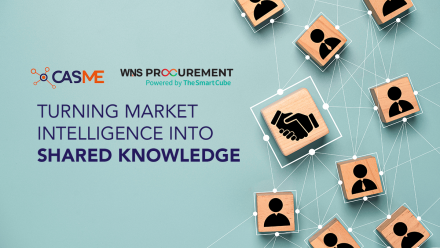
In recent years, Procurement has rapidly evolved from a tactical, cost-cutting function into a strategic powerhouse within organisations - influencing both profitability and operational efficiencies. This transformation means that procurement professionals must now balance the demands of talent, technology and data to enhance their value to the business.
At ProcureCon Europe 2024, a panel of industry leaders explored these challenges, and offered actionable insights for procurement teams aiming to strengthen their strategic role and influence within their own organisations.
On the panel:
- James Austin, Chief Procurement Officer, Smart DCC
- Daniel Johansson, Global Head Procurement Strategy and Excellence, CSL
- Ana Pertot, Head of Procurement – Commercial, R&D and Design, Zeekr Europe
- Christian Tchounda, Group CPO, Oryx Energies
- Moderator: Graham Crawshaw, Procurement Content Director, CASME.
Here are the key insights, and what they mean for procurement teams globally.
1. Integrating Data and Technology for Strategic Impact
A central theme of the discussion was the importance of using data and technology to support broader business objectives. Daniel Johansson from CSL emphasised that Procurement holds a unique vantage point within organisations, with visibility across the entire product lifecycle - from research and development (R&D) to product launch. This makes Procurement well-suited to act as an orchestrator, aligning the critical business areas with Finance, IT, and Operations, and applying the ‘glue’ that brings everyone together. Daniel went on to stress the value of Procurement using external market intelligence and supplier insights to inform strategic decisions as a trusted advisor, not merely an operational function.
James Austin from Smart DCC further explored the benefits of predictive analytics in supply chain management. By anticipating risks and inefficiencies, Procurement can proactively manage contracts and supplier relationships. He shared a manufacturing example from Mars Inc., where digital twin sensor technology was used in the production of Skittles to predict downtime and bottlenecks. Digital twin sensor technology uses real-time data from sensors to create a virtual representation of a physical object, system, or process. This virtual model can be used to monitor and analyse performance, as well as to predict potential faults. This not only reduced waste and improved efficiency, but also supported sustainability goals - showcasing how Procurement can contribute to both operational efficiency and revenue growth.
Implementation Challenges
Ana Pertot from Zeekr Europe shared a cautionary tale about the premature adoption of an ERP system that caused delays because the organisation was not fully ready for its implementation. Her message was clear: technology investments only succeed when the organisation is prepared, and teams are properly trained to use the tools effectively. This lesson is particularly relevant in fast-paced industries, such as with Zeekr’s electric vehicles, where adaptability and speed are critical to success.
2. Procurement’s Expanding Role in Business Growth
Procurement can, and should, improve profitability far beyond the traditional downstream cost-saving activities within the supply chain, according to James.
End-to-End Margin Management
To unlock its full potential, Procurement must engage upstream with Sales, Marketing and R&D – collaborating and co-owning strategic decisions that enhance end-to-end margin management and business visibility.
Christian Tchounda from Oryx Energies shared an example of this, by explaining how early supplier engagement and standardised processes reduced the lead time for opening new fuel service stations by 50%. This operational efficiency not only boosted profitability but also reinforced Procurement’s role as a strategic business partner.
Christian also explained the impact of consolidating supplier contracts across multiple regions and negotiating better terms. This not only reduced commission rates but also strengthened Procurement’s relationships with internal stakeholders, demonstrating the value of strategic supplier management in contributing to business growth.
3. Talent Development and Leadership in Procurement
Attracting and Developing Procurement Talent
The panel agreed that attracting and developing talent is critical to Procurement’s future success. James highlighted the importance of recruiting people from outside Procurement, such as those with R&D or marketing backgrounds, to improve communication and collaboration with other departments, stakeholders and suppliers. Trust is gained from meaningful engagement with stakeholders and helping them achieve their desired outcome, rather than making them feel like they’re going through a procurement process.
Ana noted that Procurement is often seen as a data-driven function, invested in financial outcomes; however, Procurement’s success also requires strong interpersonal skills. Relationship-building and negotiation are just as important as data analysis. Promoting Procurement as a dynamic, versatile career path can attract talented individuals who can navigate both the technical and social aspects of the role.
Broadening Procurement’s Influence
Christian went further, suggesting that procurement leaders should assume a broadly functional, HR-role when managing external resources, particularly suppliers. These external partners, he argued, often represent the company in front of customers, making it critical that Procurement ensures their alignment with company standards, operations, and health and safety.
The panellists also discussed the need for a more diverse skillset in Procurement, with intellectual curiosity, storytelling, and the ability to challenge the status quo becoming increasingly essential. James summarised it well: a great procurement professional isn’t just someone who closes deals, but someone who brings new ideas to the table - drawing on external trends and insights to create value for the business.
4. Unlocking Procurement’s Strategic Power
The ProcureCon Europe panel discussion made it clear that the future of Procurement lies in its ability to form strategic partnerships with other business functions, deliver value through data-driven insights, and enable cross-functional collaboration to achieve business growth and operational efficiencies.
As the procurement function continues to evolve, the ability to balance these priorities will be key to establishing its role as a profit centre and catalyst for growth within many organisations.
Key Takeaways for Procurement Professionals:
- Invest in technology but focus on training: Ensure your team is properly trained to maximise the potential of tools such as ERP systems, predictive analytics, and AI/ML.
- Develop cross-functional relationships: Engage with other departments early and often, aligning Procurement’s objectives with the wider business goals.
- Attract talent from outside Procurement: Expand your talent pool by recruiting individuals from Marketing, R&D, and other business functions to enhance stakeholder relationships and collaboration.
- Be data-driven but people-focused: While data analysis is crucial, success also depends on the ability to gain trust and communicate insights effectively with stakeholders.
CASME is committed to helping procurement professionals stay ahead of the latest trends and challenges by providing events, insights and benchmarking. At its core, it is a global community of supportive peers who share their experience, knowledge, and best practices for mutual benefit.
Ready to stay ahead of the latest trends and challenges in Procurement? Discover how CASME can enhance your strategies and connect you with a global network of professionals. Explore the benefits of membership or request a trial today.
Back to News



